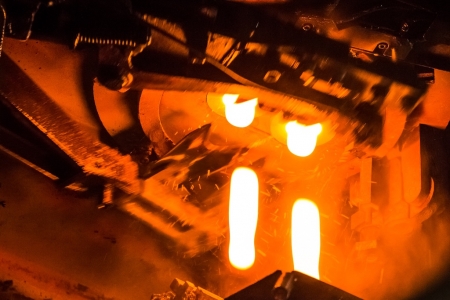Project to build first large-scale hybrid electric furnace

Europe’s leading glass container producers are collaborating to develop the world’s first large-scale hybrid oxy-fuel furnace to run on 80% renewable electricity. According to FEVE, the European Container Glass Federation, the ‘Furnace of the Future’ is a fundamental milestone in the industry’s decarbonisation journey towards climate-neutral glass packaging, replacing current fossil fuel energy sources and cutting CO2 emissions by 50%.
For the first time, the industry has adopted a collaborative approach, where 20 glass container producers have mobilised resources to work on and fund a pilot project to prove the concept. “We are extremely proud to announce this joint-industry project” commented Michel Giannuzzi, President of FEVE. “The hybrid technology is a step-change in the way we produce and will enable us to significantly reduce the carbon footprint of glass packaging production. The move marks an important milestone for the glass sector in implementing our decarbonisation strategy.”
Founding member companies of the ‘Furnace of the Future’ project are Allied Glass, Ardagh Group, BA Glass, Beatson Clark, Bormioli Luigi, Gerresheimer, GCA Gurallar Cam Ambalaj, O-I Europe, Pochet, Saverglass, SGD, Steklarna Hrastnik, Stoelzle, Verallia, Verescence, Vetreria Etrusca, Vetropack, Vidrala, Wiegand-Glashuttenwerke GmbH and Zignago Vetro.
Ardagh Group – the second largest glass packaging manufacturer in the world – has volunteered to build the furnace in Germany. It will be built in 2022, with an assessment of initial results planned for 2023. “With this new technology, we are embarking on the journey to climate-neutral glass packaging and ensuring the long-term sustainability of manufacturing” said Martin Petersson, CEO of Ardagh Group, Glass Europe. “We aim to demonstrate the viability of electric melting on a commercial scale, which would revolutionise the consumer glass packaging market.”
Bringing the ‘Furnace of the Future’ to life is an extremely ambitious project, requiring significant financial and human resources and a wide range of expertise. For this reason, the industry has committed to work together. By adopting a sectoral approach, it also intends to gain the support of the European Commission through the ETS Finance for Innovation Fund Programme. The next steps will be to select a furnace supplier, to apply for a grant to the EC Innovation Fund and set up a new legal entity to manage the project.
Despite its key importance, FEVE reports that this project is not the only one the industry is working on. Other pathways towards clean production technologies and climate-neutral glass packaging are already implemented and others are also being explored.



